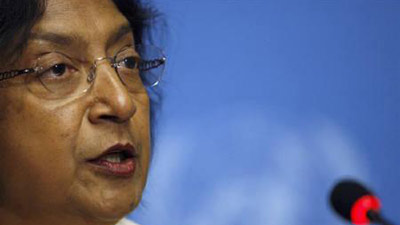The United Nations (UN) High Commissioner for Human Rights says the constitution laid a firm foundation during South Africa’s two decades of democracy but that great care needs to be taken to guard against the degeneration of the country’s institutions.
Navi Pillay – a South African judge appointed as the UN’s top human rights official in 2008 – was speaking exclusively to SABC News on the occasion of the 20th anniversary of freedom.
She urged the country to exercise its moral leadership, gained after years of struggle, to stand up against human rights violations wherever they occur.
Like most South Africans, political freedom in the country was a watershed moment for Navi Pillay.
She was the first non-white woman to open a law practice in then Natal Province and was exposed to the underbelly of illegitimate detentions, interrogations and torture under draconian Apartheid laws.
“We all suffered the humiliation of Apartheid and as a lawyer I know personally how people were tortured, detained and these included children, firstly what I find most gratifying is that we had a peaceful revolution, as high commissioner now I can see how conflicts develop and break up communities, destroy countries and institutions, so we’re very luck there, I think that is gratifying. I think that our constitution is one of the most important in the world and its inclusive, it protects equality and non discrimination and the constitutional court has been very good in delivering on economic rights such as right to housing and generally affording us justice by interpreting the constitution progressively,” says Pillay.
She had high praise for the country’s inclusive constitution, steeped in human rights principles of equality and non-discrimination, as a solid framework for the democracy. But highlighted some of the challenges that remain.
“Poverty being one, unemployment and inequalities – there are rich and poor in the country, many complain about the lack of delivery of social services and of course there’s xenophobia, we’re not treating outsiders as well as we should in terms of our principles of tolerance and respect for others and people are complaining of corruption being the cause of inequalities, unemployment and so on,” says Pillay.
She says South Africa is indebted to many people’s around the world for helping the country end Apartheid urging it to use it’s standing to promote important human rights principles, including the cause of LGBT community in Africa and elsewhere.
“It is a concern, you know people respect us and they expect us to take up issues, both South Africans and the leaders to stand up for human rights and condemn violations wherever it occurs,” says Pillay.
She praised the country’s vibrant civil society and media as very active and alert, among the institutions she urged protection for to ensure the gains made are not lost. She also highlighted the importance of safeguarding the rule of law to ensure the country remains on a path to good health.
“We have to watch out and really invest in our institutions, safeguard them and that’s what I mean. Over 20 years we can have successes, we can report failings, it’s not a long period, it’s a short period. Now you mention judiciary, as a former judge let me stress the importance of the rule of law, no-one is above the rule of law and the rule of law must protect the rights of everyone. Who does this? The judiciary and the courts and respect for the rule of law and independence of the judiciary is what distinguishes us from the arbitrary exercise of power to a democratic society,” added Pillay.
She stressed the importance of people sharing the wealth of the country and urged government to ratify the UN Covenant on Economic, Social and Cultural Rights that safeguards labour rights, the rights to health, education and an adequate standing of living.
Pillay leaves her position as High Commissioner in August.
Sherwin Bryce-Pease
– By Sherwyn Bryce-Pease


